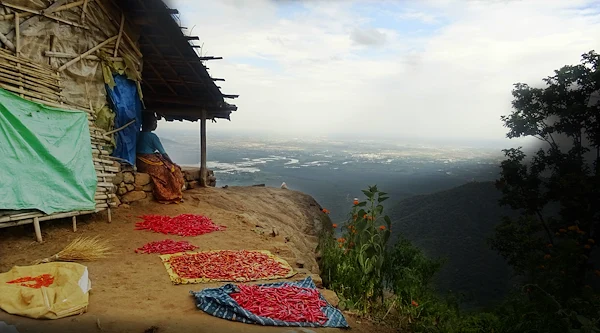.png?sfvrsn=f7b142b7_1)
FAO Feature Story
Members' Voices: Mathew John of Last Forest Enterprises Pvt. Ltd.
With 2024 updates
10/06/2021
Last Forest is a social enterprise pioneering sustainable living choices by connecting communities to markets. We promote eco-friendly, thoughtful and meaningful products made by Indigenous communities in the mountains of the Nilgiri Biosphere Reserve in South India.
Indigenous communities represent 8.6 percent of the population of India. They are the last stewards of complex systems of biodiversity that contain the heritage of our planet, and we are committed to enabling their traditional customs and activities to continue thriving. Our goal is to have a meaningful and positive impact on marginalized communities, pioneer a sustainable economic model for social enterprises, and become a game-changer that influences the market to be more aware and appreciative of rural, local, natural products.
At Last Forest, we focus on promoting artisanal honey and personal care products made from beeswax, created by Indigenous mountain women. The honey and beeswax that we source come from the giant rock bee (Apis dorsata), which plays an important role in the forest ecosystem of the Nilgiri Biosphere Reserve.
Together with our partners, we work closely with 150 villages and have supported nearly 6 500 households. The creation of the Aadhimalai Producer Company in 2013, who are our primary suppliers, was a brave new step for us, as the supply and marketing functions became two distinct functions with separate legal entities.
The Aadhimalai Producer Company has a total membership of 1 609 producers, all of whom are Indigenous. The Company’s production and value-addition activities take place at village-level production centres that are entirely run and operated by women. In turn, the women no longer have to leave their villages in search of work and can earn an income in their village while continuing to take care of their homes and families.
In terms of capacity building, there is so much more that we have accomplished. We worked with the youth of many communities to help build their skills. Today, some of them now hold local political positions. Many have taken part in international fora like Slow Food and organic conferences. Others have learned to access government-sponsored schemes and run production centres.
We decided to work in mountains because we wanted to raise awareness of the traditions and cultures of the indigenous communities there and of their role as stewards of the mountains, while supporting them toward alternative economic pathways. Mountains matter to us because of their importance as part of the larger ecosystem, which we believe needs to be better understood, recognized and incorporated as an integral part of State planning.
For example, many mountain areas are key water sources and hence are important feeders to the sprawling plains below. However, often little or no thought is given to preserving and understanding mountain watersheds. This is why we promote payment for ecosystem services. We are exploring how mountain communities, who are the stewards of these environments, can be recognized for this and compensated.
Together with our allied institutions, we furthermore work on a range of thematic areas, including conservation issues, non-timber forest product research and documentation, water and sanitation, mountain products, gender equality, and a host of livelihood-related matters, such as promoting organic and traditional agriculture. We approach our work in a holistic manner, believing that development work must be done in harmony with the needs of the environment. It is also important to us that our initiatives are rooted in ethics and value systems, constantly respecting cultural traditions and knowledge.
2024 Updates
With the help of a grant and technical support from the Mountain Facility, the Mountain Partnership’s global, multi-partner financing mechanism, Last Forest has made significant investments in various marketing strategies. This has resulted in notable returns and has kickstarted Last Forest’s growth, particularly with increases in honey sales and return on investment of 32.5 percent.
In addition to our digital efforts, we have invested in tangible promotional materials to bolster our brand presence. For example, our ‘Nilgiri Brew’ mugs act as both functional items and brand ambassadors, spreading awareness about Nilgiri coffee with every sip. Similarly, our carefully crafted ‘2024 calendar’ will provide year-long brand exposure while emphasizing our mountain identity.
Quality assurance training sessions were also conducted by Aadhimalai Producer Company and Last Forest aimed at enhancing product innovation, ensuring quality control, and promoting sustainability in the Nilgiris mountain region. These sessions brought together 31 stakeholders to explore innovative uses of local ingredients, emphasize the importance of quality checks, address the impacts of climate change, and integrate Fair Trade principles into daily practices.
Our commitment to sustainability extends to our sourcing practices. We implemented Participatory Guarantee System (PGS) Wild to certify and promote sustainable gathering of wild non-timber forest produce and support the local Irula communities in the Pillur forest ranges. Introducing PGS Wild to communities led to the participation of 132 people from four villages in the Pillur region, and it will have nationwide significance for sustainable practices. The next steps for the implementation of PGS Wild will include data collection in the upcoming honey collection season. The model will then be shared with networks across India.
Learn more about Last Forest
.png?sfvrsn=f7b142b7_1)
e63edf6a-5fc6-4865-9c22-5438e23c95d4.jpg?sfvrsn=70dd28b6_1)

0d905027-49f9-4a01-9ab1-2d32a9908020.jpg?sfvrsn=1c35488b_1)